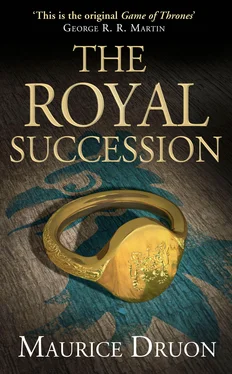The service came to an end; the organ and the choir fell silent. Both wings of the great door stood open; but no daylight penetrated into the church.
Suddenly, the Cardinals understood; and an angry clamour broke out. A brand-new wall blocked the doorway. During the mass, the Regent had bricked up the exits. All occurred during the ceremony, obscuring the sun. The Cardinals were prisoners.
There was a fine panic; prelates, canons, priests and valets, all mingled together, ran to and fro like rats in a trap. The pages, climbing on each other’s shoulders, hoisted themselves up to the windows, from where they shouted: ‘The church is surrounded by armed men!’
‘What are we going to do, what are we going to do?’ groaned the Cardinals. ‘The Regent has played a trick on us.’
‘That’s why he favoured us with such loud music!’
‘It’s an attack on the Church. What are we going to do?’
‘We’ll excommunicate him,’ cried Caetani.
‘But what if he starves us to death, or has us massacred?’
The two brothers Colonna and the people of their party had already armed themselves with heavy bronze candelabra, benches and processional maces, determined to sell their lives dearly. The Italians and the Gascons were already beginning to hurl reproaches at each other.
‘All this is your fault,’ cried the Italians. ‘If you had only refused to come to Lyons. We knew some dastardly trick would be played on us.’
‘If you had elected one of us, we should not be here now,’ replied the Gascons.
‘It’s your fault, you bad Christians!’
They were almost on the point of coming to blows.
One door alone had not been entirely blocked; barely room for a man to pass through had been left, but the narrow opening was a hedge of pikes held in iron gauntlets. The pikes lifted and the Count de Forez, in armour, followed by Bermond de la Voulte and a few more armed men, entered the church. They were received with a volley of threats and obscene insults.
His hands crossed on the hilt of his sword, the Count de Forez waited till the clamour died down. He was a strong, courageous man, unmoved by threats or entreaties, profoundly shocked by the example the Cardinals had given during the last two years, and prepared to go to any length to obey the Count of Poitiers’s instructions. His rugged, wrinkled face appeared through his open visor.
When the Cardinals and their people had grown hoarse, his voice rang out over their heads, precise and emphatic, reaching to the end of the nave.
‘Messeigneurs, I am here on the orders of the Regent of France to ask you to devote yourselves henceforth solely to electing a Pope, and to inform you that you will not leave here until that Pope is elected. Each Cardinal may keep with him only one chaplain and two pages or clerks of his choice to serve him. Everyone else will leave.’
The Gascons and the Provençaux were no less indignant than the Italians.
‘It’s a felony!’ cried Cardinal de Pélagrue. ‘The Count of Poitiers promised us that we should not even have to go into seclusion, and it was because of it that we agreed to meet him at Lyons.’
‘The Count of Poitiers’, replied Jean de Forez, ‘was then speaking in the name of the King of France. But the King of France is dead, and it is in the name of the Regent that I am speaking to you today.’
There was unanimous indignation among his hearers. There were oaths in Italian, Provençal and French. Cardinal Duèze had fallen prostrate in a confessional, his hand to his heart, as if his years could not bear the shock, and he pretended to join in the protests with inaudible murmurs. Arnaud d’Auch, the Cardinal Camerlingo, a corpulent and sanguine prelate, advanced on the Count de Forez and said menacingly: ‘Messire, a Pope cannot be elected in such conditions, for you are violating the constitution of Gregory X, which obliges the Conclave to meet in the town in which the Pope died.’
‘You were there, Monseigneur, two years ago, and you dispersed without having made a Pope, which is also a breach of the constitution. But if, by any chance, you should wish to be taken back to Carpentras, we will conduct you there under a good escort and in closed coaches.’
‘We may not deliberate under the threat of force!’
‘That is why there are seven hundred men outside, Monseigneur, to guard you. They have been provided by the authorities of the town to ensure your protection and your isolation, as the constitution prescribes. The Sire de la Voulte here, who is a native of Lyons, is in command of them. Messire the Regent also wishes you to know that if, by the third day, you have not agreed, you will receive but one dish in the twenty-four hours by way of food and, after the ninth day, there will be but bread and water, as is also prescribed in the constitution of Gregory. And finally, if enlightenment does not come to you through fasting, he will destroy the roof and expose you to the inclemency of the weather.’
Bérenger Frédol, the elder, intervened: ‘Messire, you will be guilty of murder if you subject us to such treatment, for there are some among us who will not be able to support it. Look at Monseigneur Duèze, who has already collapsed and is in need of care.’
‘Oh, yes, oh, most certainly,’ Duèze complained feebly; ‘I shall most certainly not be able to support it.’
‘What’s the use?’ cried Caetani. ‘Can’t you see we have to do with savage and stinking beasts? But let me tell you, Messire, that instead of electing a Pope, we shall excommunicate you, you and your perjurer.’
‘If you hold a meeting of excommunication, Monseigneur Caetani,’ the Count de Forez replied calmly, ‘the Regent might make known to the Conclave the name of certain sorcerers and casters of spells who should be put at the top of the list for roasting.’
‘I really don’t see,’ said Caetani, beating a hasty retreat, ‘I really don’t see what sorcery has to do with the matter, since it’s with the election of a Pope that we are concerned.’
‘Ah, Monseigneur, I see we understand each other; please dismiss the people you do not need, because there will not be enough food to feed them all.’
The Cardinals realized that all resistance was vain and that this armed man, who was giving them the Count of Poitiers’s orders in so firm a voice, was adamant. Already, behind Jean de Forez, the men-at-arms were beginning to enter one by one, pike in hand, and to deploy at the end of the church.
‘Since we cannot use force, we shall use cunning,’ said Caetani in a low voice to the Italians. ‘Let us pretend to submit, because at the moment we can do no other.’
They each chose the three most faithful servants from among their following, those they thought might be the best advisers, the most cunning in intrigue, or the most apt at tending to their physical wants in the difficult material circumstances in which they would have to live. Caetani kept Father Bost, Andrieu and Pierre, the priest with the two thumbs, that is to say the men who had been implicated in casting the spell on Louis X; he preferred that they should be shut up with him, rather than risk their talking either for money or under torture. The Colonnas kept four pages who could fell an ox with their fists. Canons, clerks, linkmen and trainbearers began to leave, one by one, through the hedge of armed men. As they passed, their masters whispered:
‘Let my brother the Bishop know … Write in my name to my cousin de Got … Leave at once for Rome …’
At the moment when Guccio Baglioni was preparing to leave, Jacques Duèze put out his thin hand from within the confessional, where he lay in a state of collapse, and seized the young Italian by his robe, murmuring: ‘Stay with me, my boy. I am sure you will be a great help to me.’
Читать дальше












